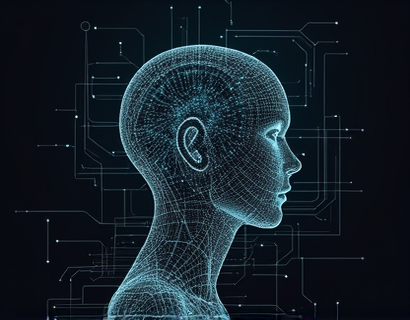Unlocking Peak Productivity with Intelligent AI Task Management Solutions
In the fast-paced world of today, where time is a precious commodity, the quest for peak productivity has become more crucial than ever. The integration of Artificial Intelligence (AI) into task management solutions represents a significant leap forward in this pursuit. AI-driven intelligent agents are redefining how we manage both personal and business tasks, offering a level of efficiency and effectiveness that was previously unattainable. These advanced systems not only streamline operations but also enhance overall productivity by allowing users to concentrate on high-priority activities, thereby maximizing their potential.
The core idea behind these intelligent AI task management solutions is to create a symbiotic relationship between human users and AI agents. These agents are designed to understand, predict, and manage tasks based on user preferences, historical data, and real-time inputs. By automating routine and repetitive tasks, AI agents free up valuable time and mental energy, enabling individuals and businesses to focus on strategic, high-value activities that drive growth and innovation.
Enhancing Personal Productivity
For personal productivity enthusiasts, the benefits of AI task management are manifold. Imagine having a personal assistant that not only reminds you of upcoming appointments and deadlines but also proactively suggests the best times to tackle specific tasks based on your productivity patterns. AI agents can analyze your daily routines, identify time-wasting activities, and offer personalized recommendations to optimize your schedule. This level of customization ensures that each user's unique needs and preferences are taken into account, leading to a more tailored and effective productivity enhancement.
One of the key features of these AI agents is their ability to learn and adapt over time. Through machine learning algorithms, these agents continuously refine their understanding of user behavior and preferences. This means that as you interact with the system, it becomes more accurate in predicting your needs and suggesting optimal task management strategies. For instance, if you consistently procrastinate on certain types of tasks, the AI can implement strategies to mitigate this, such as breaking down large tasks into smaller, more manageable steps or setting specific time blocks for focused work.
Streamlining Business Operations
In a business context, the impact of AI task management solutions is even more profound. Organizations are under constant pressure to increase efficiency, reduce costs, and deliver high-quality results. AI-driven task management systems can significantly contribute to achieving these goals by automating routine administrative tasks, such as scheduling meetings, managing emails, and tracking project progress. This automation not only reduces the workload on employees but also minimizes the risk of human error, ensuring that tasks are completed accurately and on time.
Moreover, these systems can integrate seamlessly with existing business tools and platforms, creating a cohesive and efficient workflow. For example, AI agents can sync with calendar applications to automatically schedule meetings based on availability, or integrate with project management tools to update task statuses in real-time. This level of integration ensures that all team members are on the same page, reducing miscommunications and enhancing collaboration.
Prioritization and Focus
One of the most critical aspects of productivity is the ability to prioritize tasks effectively. AI task management solutions excel in this area by using advanced algorithms to assess the urgency and importance of each task. Based on these assessments, the AI can suggest the optimal order in which tasks should be completed, ensuring that high-priority items are addressed first. This prioritization helps users maintain focus on what truly matters, preventing them from getting bogged down by less critical tasks.
Additionally, these systems can help users avoid the common pitfall of multitasking, which often leads to decreased productivity and increased stress. By analyzing task dependencies and resource availability, AI agents can recommend a sequential approach to task completion, ensuring that each task is given the attention it requires without overlapping or causing bottlenecks. This structured approach not only enhances efficiency but also reduces stress levels, contributing to a healthier work-life balance.
Enhancing Decision-Making
Beyond task management, AI-driven intelligent agents can also play a significant role in enhancing decision-making processes. By analyzing vast amounts of data and providing insights, these agents help users make informed decisions quickly. For instance, in a business setting, an AI agent can review project data, financial reports, and market trends to suggest the best course of action. This data-driven approach ensures that decisions are based on objective analysis rather than intuition or guesswork.
For personal decision-making, AI agents can assist with everything from planning a vacation to managing finances. By considering various factors such as budget, preferences, and past behavior, these agents can offer tailored recommendations that align with the user's goals and values. This level of support not only saves time but also empowers individuals to make more confident and strategic decisions.
Continuous Improvement and Adaptation
The true power of AI task management lies in its ability to continuously improve and adapt. As users interact with the system, the AI learns from their actions and feedback, refining its performance over time. This ongoing learning process ensures that the system remains relevant and effective, even as user needs and circumstances change. For example, if a user starts a new project or takes on additional responsibilities, the AI can quickly adjust its strategies to accommodate these changes, maintaining optimal task management without requiring manual intervention.
Furthermore, these systems can provide valuable analytics and reports, offering insights into productivity patterns, time usage, and task completion rates. These insights can be used to identify areas for improvement and implement targeted strategies to boost productivity further. For businesses, this data can be invaluable for performance evaluations, resource allocation, and strategic planning.
Overcoming Challenges and Ensuring Success
While the benefits of AI task management solutions are clear, there are several challenges that users and organizations must address to ensure successful implementation. One of the primary concerns is the initial setup and integration with existing systems. This process can be complex and time-consuming, requiring technical expertise and careful planning. To overcome this, it is essential to choose AI solutions that offer user-friendly interfaces and robust support services, ensuring a smooth transition and minimal disruption to daily operations.
Another challenge is the potential resistance to change from users who are accustomed to traditional task management methods. To address this, it is crucial to provide comprehensive training and support, highlighting the benefits and ease of use of AI-driven systems. Demonstrating tangible improvements in productivity and efficiency can help alleviate concerns and foster adoption.
Building Trust and Transparency
Trust is a fundamental aspect of any human-AI interaction. Users must feel confident that their tasks are being managed effectively and that the AI is acting in their best interests. To build this trust, transparency is key. AI task management solutions should provide clear explanations for their recommendations and decisions, allowing users to understand the reasoning behind each action. This transparency not only builds trust but also empowers users to make informed decisions and adjust settings as needed.
Privacy and security are also critical concerns. AI systems handle sensitive information, and users must be assured that their data is protected. Implementing strong encryption, adhering to data protection regulations, and providing clear privacy policies are essential steps in ensuring user confidence and compliance with legal standards.
The Future of Task Management
As AI technology continues to evolve, the potential for intelligent task management solutions becomes even more exciting. Future advancements may include more sophisticated natural language processing, enabling seamless voice-based interactions, and enhanced emotional intelligence, allowing AI agents to better understand and respond to user emotions and stress levels. These developments will further enhance the user experience, making AI task management an even more integral and beneficial part of daily life.
In the realm of business, the integration of AI with other emerging technologies such as the Internet of Things (IoT) and blockchain could lead to even more innovative applications. For instance, AI agents could monitor and optimize resource usage in real-time, or ensure the secure and transparent execution of contracts and transactions. These advancements promise to revolutionize not only task management but also broader operational and strategic processes.
In conclusion, AI-driven intelligent task management solutions represent a significant leap forward in productivity enhancement. By automating routine tasks, providing personalized recommendations, and offering data-driven insights, these systems enable users to focus on high-priority activities, leading to increased efficiency and success. As the technology continues to mature, the potential for even greater improvements and innovations is vast, making it an exciting time for productivity enthusiasts and business professionals alike.











































